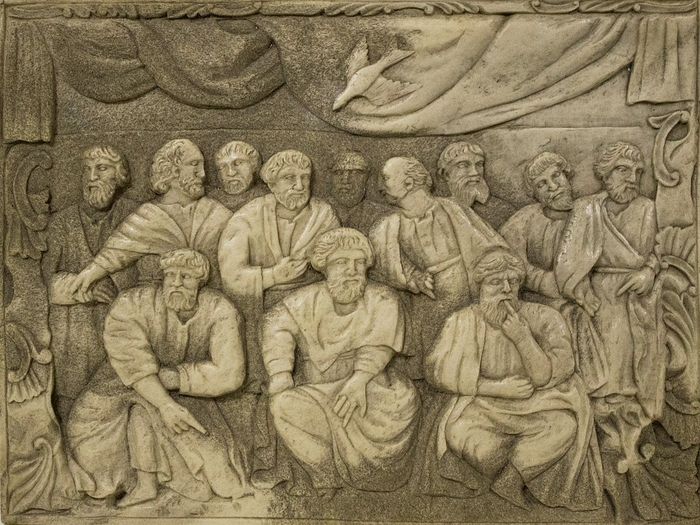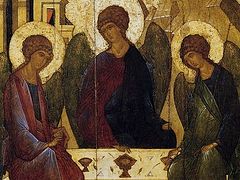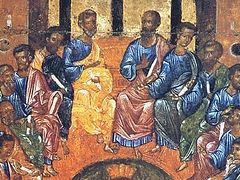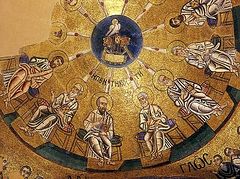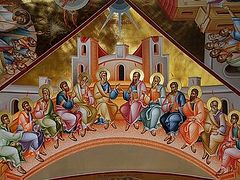This is the final, saving day of Pentecost. The Holy Church sings at the Vespers of Pentecost: We celebrate Pentecost and the coming of the Spirit, and the time appointed for the promise, and the fulfillment of hope. These are the first words from the first hymn of Pentecost heard by the faithful. These words are a succinct, almost text-book-like definition of this feast. The Coming of the Spirit is the definition of Pentecost: Today, the Holy Spirit descends on the Apostles and transfigures them. The Holy Spirit embeds, within the Apostles, the strength from on high—exactly as promised by the Lord at His Ascension—to become His witnesses to the world. Perhaps we have said it before but there is no harm in repeating this fact: The Greek word for witness is martyr. Therefore, Pentecost is a day of witness—of martyrdom. Pentecost is the outpouring of the Holy Spirit, the transmittance of Christ’s Truth to the World. The Holy Spirit enables the Apostles to preach the Lord Jesus and His saving work of redemption, His Cross and His Resurrection, to the ends of the World, to every nation and in every tongue. The Holy Spirit gives Life to the Church from that initial Pentecost until this very Pentecost: the Holy Spirit fills our Sacraments and completes them. At another hymn from Pentecost Vespers we hear that the Holy Spirit perfects priests, makes learned the illiterate, makes fishermen theologians. He alone constitutes the system (or the institution) of the Church. St. Nikolai (Velimirovich) of Zica wrote, in his time, that the Lord said: “Nineteen centuries I am with you, man, nineteen centuries of grace, of sacraments, of miracles!” Pentecost is the promise, the eternal contract between Christ and the Church: by the Gift of the Comforter to the Church, we have the guarantee of victory. We remain alive and vibrant even while held in death’s grasp, as heard at the Kneeling Vespers on this day. Why is this so? The Apostle Paul preached: In Him we live and move and have our being.
The Comforter is Truly God, sings the Church on this day. This dogma was not manifest to the world prior to Pentecost. The Holy Spirit is the Third Person of the Trinity. Today, The Comforter enters the world in a sacramental way. Through the preaching of Christ’s Death and Resurrection and the serving of the Sacraments wherein man is renewed, the Holy Spirit brings salvation and redemption to countless men and women, to all those who wish to be saved, to be made whole (recall Christ’s words to the Paralytic: Do you wish to be made whole)… He brings down to Hades and raises, He gives life to all those who are in the grasp of death, as we hear in the prayers at the Kneeling Vespers on Pentecost. We have a sacred mission to spread this truth ourselves in synergy with the Holy Trinity, and in cooperation with the Church, the Body of Christ. We, the Orthodox Church collectively, have a sacred mission to make disciples of all nations. The Apostles began on that Pentecost. And considering the state of the world at the present, would you also not say that now, more than ever, the fields are ripe for harvest? We—everyone who is reading these words today—can play our part immediately. How? Believe in the Lord Jesus, as the Apostles Peter commanded the assembled crowds (in effect, the first Church gathering) at the very first Pentecost. We have all been baptized and we have all tasted of the Lord’s Grace in the Sacraments—each time we taste of the Lord’s Grace, this is a Sacrament. Many of us habitually view our ecclesial life as a tedious obligation. The Lord requires one thing: sincere Faith, not just in an academic, individualistic (think: my prayer life, my fasting) faith, but a living faith that transfigures the inner man to a state wherein he does not need to preach, but his every breath and action is a testament to Him, Who loved us first and gave His Life for our own.
The Apostle Peter addressed those gathered at that very first Pentecost extensively. This homily is found in the second chapter of Acts. Amidst the many beautiful things we read there—especially about Christ sitting as Lord and King on David’s throne, St. Peter says: God has raised this Jesus to life, and we are all witnesses of it. He is exalted to the right hand of God, he has received from the Father the promised Holy Spirit and has poured out what you now see and hear. Therefore let all Israel be assured of this: God has made this Jesus, whom you crucified, both Lord and Messiah. Moments earlier, the Holy Spirit descended on Christ’s Apostles in the form of fiery tongues. The Jews gathered there—Jews from every corner of the Roman Empire who would typically make the pilgrimage to Jerusalem for the Feast of the Israelite Pentecost (which we will consider below)—for multiple generations no longer spoke Hebrew, despite the preservation of their faith. Yet, they heard the Apostles, each man in his own tongue preaching on the magnificence of God. This magnificence is the realization of the truth of Christ being the incarnate God-Man, and the realization that the God-Man suffered, was Crucified and arose in glory for each one. What we have been celebrating from Pascha until now begins—from Pentecost—to transfigure the world. One might properly say that Pentecost is the door through which Pascha—the Truth of Christ’s Resurrection—is made available to the World as a free gift.
We must first understand that there existed an ancient feast of Pentecost kept by the Israelites. In the Old Testament, the feasts instituted by God were a prefigurement of the salvific events associated with Christ the God-Man’s earthly life. Passover, wherein Israel passed over from Egypt (death) to freedom (life) through the parted Red Sea, wherein Pharaoh (the devil) drowned, is fulfilled in the actual Passover of Christ’s Resurrection, wherein Christ the God-Man brings the New Israel, the Church (which is meant to encompass the new, redeemed humanity) from death to life. God gives prophecies, promises, and vows in the Old Testament, and He always grants a sign or token of the pledge. Always, a foretaste of the coming glory is given with the prophecy. And so it was concerning the ancient Pentecost of Israel. On the Fiftieth Day—Pentecost in Greek means “The Fiftieth” after the Passover—Moses ascended Sinai and received the Law. Therefore, the ancient Pentecost was a Feast of Israel receiving the Torah, God’s divine law—the Feast of the Law-Giving. The ancient Pentecost is a token of the actual Pentecost: He that formerly spake through the prophets, and was foretold in the law unto the imperfect, the Comforter, the true God, doth become known today unto the ministers and witnesses of the Word—we hear in the Matins of Pentecost.
Prior to this initial ancient Pentecost whereon Moses ascended Sinai and received the Law, the last occasion at which mankind ascended (or attempted to ascend) to God was at the Tower of Babel. And the result was that man did, indeed, meet God. God descended to mankind to sow confusion and discord amidst the Nations. The Kontakion of Pentecost teaches us that at Babel, When He descended and confounded the tongues, the Most High divided the nations; yet our Pentecost is the overturning of Babel. Within our Pentecost, the discord and division instituted at Babel are rescinded: And when He divided the tongues of fire, He called all men into unity. Therefore, Pentecost is also a calling, an active calling: We, Christ’s Church, this theanthropic (divine-human) organism—are called to unity. And this unity is not ecumenism, nor does it advocate for any sort of worldly co-operation amidst nations (though friendly relations between nations is not evil). No, this unity is a unity founded on Christ Jesus and His Blood, and His Work of Salvation. This is the provocation of Pentecost. The final hymn of Vespers for this Feast poignantly describes this comparison between Babel and Pentecost: Tongues were confused once when men dared build the Tower. Tongues now obtain skill, for the glory of divine knowledge. There, God condemned the impious for their transgression; here, by the Spirit, Christ illumined the fishermen. Then, discord was contrived as penalization; now a new concord has arrived, for the salvation of our souls.
The Church traverses the years and centuries with this divinely granted concord obtained at Pentecost. Pentecost and the entrance of the Holy Spirit into time, the transfiguration of man in the Holy Sacraments of Baptism, Confirmation and Holy Communion, the unification of the marriage bond in Christ, repentance and the obtaining of our sin’s forgiveness in the Sacrament of Confession. While the Sacraments have their root in the life of Christ, and as such, they existed before Pentecost, it is because of Pentecost that they are made available to us. Today, on this Pentecost, we kneel and once again, we are renewed by the descent of the Holy Spirit that comes upon the believers as the Priest reads the Kneeling Prayers. Not only do we, the visible militant Church kneel, but even the invisible triumphant Church, our departed ancestors through the generations—these all mystically bend the heart’s knee with us. Yes, on this day we make supplication for those held in Hades that they receive some refreshment and grace. This is the eternal dimension of Pentecost. Pentecost also contains the dimension of space and time: Creation itself, the heavens and the earth—from the tallest mountains to the subterranean vaults of the deeps—are renewed by the Holy Spirit’s descent on this Great and Holy Day of Pentecost, this eschatological beginning and end. Creation itself, the animate and inanimate worlds—these too bend their knee. Our Christian life is reflected in Pentecost as the Holy Spirit fills hearts and renews them in an Apostolic fashion, enabling each one to become a Living Witness of the Word. Celebrate this Feast in an Orthodox manner, by the sincere confession of your sins and the reception of the Holy Eucharist. And, as you kneel with the Kneeling Prayers, sincerely entreat that the Holy Spirit dwell in you, making you His abode on this day, unto the soul’s revitalization for His purpose: the renewal of Creation, the salvation of the World.

